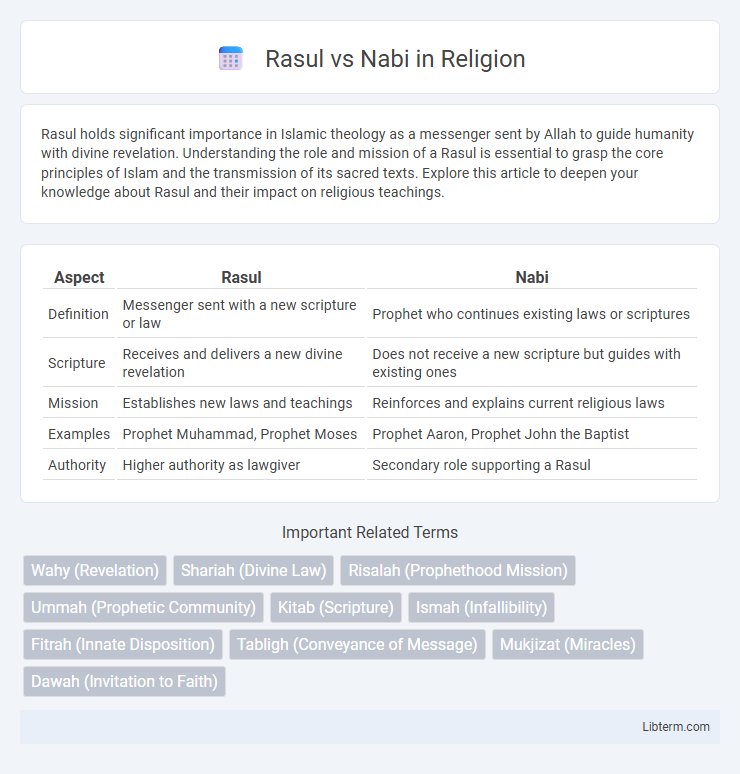Rasul holds significant importance in Islamic theology as a messenger sent by Allah to guide humanity with divine revelation. Understanding the role and mission of a Rasul is essential to grasp the core principles of Islam and the transmission of its sacred texts. Explore this article to deepen your knowledge about Rasul and their impact on religious teachings.
Table of Comparison
| Aspect | Rasul | Nabi |
|---|---|---|
| Definition | Messenger sent with a new scripture or law | Prophet who continues existing laws or scriptures |
| Scripture | Receives and delivers a new divine revelation | Does not receive a new scripture but guides with existing ones |
| Mission | Establishes new laws and teachings | Reinforces and explains current religious laws |
| Examples | Prophet Muhammad, Prophet Moses | Prophet Aaron, Prophet John the Baptist |
| Authority | Higher authority as lawgiver | Secondary role supporting a Rasul |
Understanding the Terms: Rasul and Nabi
Rasul and Nabi are key figures in Islamic theology, with Rasul referring to a messenger who receives and conveys a new divine revelation, while Nabi denotes a prophet who continues to uphold and teach existing guidance. Every Rasul is a Nabi, but not every Nabi attains the status of Rasul, emphasizing the distinction based on the reception of a new scripture or significant law. Understanding these terms clarifies the hierarchy and roles of prophetic figures within the Quranic tradition.
Etymology and Semantic Roots
The terms "Rasul" and "Nabi" originate from Arabic, with "Rasul" deriving from the root "r-s-l," meaning "to send" or "messenger," indicating one who is sent with a divine message. "Nabi" stems from the root "n-b-a," which means "to prophesy" or "announce," referring to one who communicates divine revelation and guidance. While both denote prophetic roles, "Rasul" emphasizes the mission of delivering specific scripture or laws, whereas "Nabi" broadly signifies a spiritual guide or proclaimer of God's will.
Core Differences Between Rasul and Nabi
A Rasul is a prophet who is given a new Shariah (divine law) by Allah, whereas a Nabi is a prophet who follows and reinforces the existing Shariah. Every Rasul is a Nabi, but not every Nabi is a Rasul, highlighting the distinction in their missions and authority. Rasul carries the responsibility of delivering a new message and scripture, while Nabi primarily guides people according to an already revealed law.
Roles and Responsibilities of a Rasul
A Rasul is a prophet specifically appointed to deliver and uphold a new divine revelation or scripture, tasked with guiding people according to God's explicit commandments. Their responsibilities include conveying God's message accurately, establishing and enforcing religious laws, and often facing opposition while calling their community to faith and obedience. Unlike a Nabi, who reiterates and reinforces existing teachings, a Rasul uniquely introduces a fresh, authoritative covenant from God.
Functions and Duties of a Nabi
A Nabi primarily serves as a spiritual guide who receives and conveys divine revelations to their community, emphasizing the implementation of God's laws and moral teachings. Their duties include calling people to monotheism, reinforcing the principles of faith, and exemplifying ethical conduct through personal behavior. Unlike a Rasul, who delivers a new Shariah or scripture, a Nabi often confirms and preserves existing divine messages, ensuring religious continuity.
Scriptural Evidence: Qur’anic Perspectives
The Qur'an distinguishes between Rasul and Nabi, emphasizing that every Rasul is a Nabi, but not every Nabi is a Rasul, as seen in Surah Al-An'am (6:48) where Messengers receive explicit scriptures, while Prophets primarily convey existing revelations. Rasul, exemplified by prophets like Muhammad and Moses, are given new laws or a scripture, whereas Nabis maintain and reinforce previous teachings without introducing a new divine book. Surah Al-Ahzab (33:40) highlights Muhammad's role as the final Rasul, cementing the Qur'anic view of sequential prophethood with varying responsibilities in revelation delivery.
Examples of Rusul and Anbiya in Islamic Tradition
Rasul and Nabi are distinct roles in Islamic tradition, where a Rasul is a messenger sent by Allah with a new Shariah or divine law, while a Nabi is a prophet who continues guiding people without bringing new legislation. Examples of Rusul include Prophet Muhammad, who delivered the Quran and established Islam, and Prophet Musa (Moses), who brought the Torah. Notable Anbiya include Prophet Ibrahim (Abraham) and Prophet Dawud (David), who were divinely guided but did not receive new laws.
Significance of Revelation: Scripture vs. Guidance
Rasuls receive divine revelation in the form of scripture, providing a concrete, preserved text that serves as a foundational legal and spiritual guide for their communities. Nabis, on the other hand, are primarily messengers who receive ongoing guidance and inspiration without necessarily delivering new written scripture, emphasizing continual moral and spiritual direction. The distinction highlights the critical role of Rasul in transmitting authoritative scripture, while Nabi focuses on reinforcing and interpreting divine guidance within an existing religious framework.
Impact on Muslim Belief and Theology
Rasul and Nabi hold distinct yet complementary roles in Islamic theology, deeply influencing Muslim belief by defining the hierarchy of prophethood and the transmission of divine guidance. A Rasul is a messenger who brings a new Sharia (divine law) and scripture, exemplified by Prophet Muhammad as the final Rasul, while a Nabi reinforces existing teachings without introducing new laws. This distinction shapes core Islamic doctrines about revelation, prophethood, and the continuity of divine messages, reinforcing belief in Muhammad's finality and the authenticity of Islamic teachings.
Common Misconceptions and Clarifications
Rasul and Nabi are distinct Islamic terms often mistakenly used interchangeably; a Rasul is a prophet who receives a new divine law (Sharia) and is authorized to convey a new scripture or message, whereas a Nabi is a prophet who follows and reaffirms existing teachings without introducing new law. Common misconceptions arise from overlooking these differences, leading to confusion about their roles and responsibilities in Islamic theology. Clarifying this distinction is essential to understanding Islamic prophethood, where every Rasul is a Nabi but not every Nabi is a Rasul.
Rasul Infographic

 libterm.com
libterm.com